Dashnor Kaloçi
The first part
Memorie.al publishes the unknown story of the main leaders of the nationalist organization ‘Balli Kombëtar’ and ‘Legaliteti’, who in the late autumn of 1944, after realizing that Enver Hoxha’s partisans had won the war and taken power from It was already a matter of days, they first gathered in Preza Castle, where after a meeting chaired by Abaz Kupi and Mit’hat Frashëri, they decided to leave Albania and from there marched towards the city of Shkodra, where after much debate and negotiation with the nobility of that city, led by Gjon Markagjoni and Hasan Isufi, who tried to prevent them, with the help of German forces and Mehdi Frashëri’s son, were able to cross the state border and travel in the direction of of Bar, where the ship of Sulejman Latifi, originally from Shkodra, was waiting for them, which was taken by 10 napoleons of gold to each of the 250 “passengers” who boarded there, to then travel to the shores of Italy isë. The sad story of the main leaders of ‘Balli’ and Legality ‘at the end of 1944, comes through the testimonies of Arif Peza, one of the main exponents of the Youth of’ Balli Kombëtar ‘who in June 1944, at the head of a gang who was in command, had gone to Kosovo to fight against Draraza Mihailovi çet’s Chetnik forces. How did Kupi leave Albania with Frashri and their main collaborators, who after staying for three or four years in the camps of Italy, which had been opened by the Anglo-Americans, some of them gained political asylum and were scattered in different countries of the world, as: USA, Australia, Argentina, Brazil etc., while the rest who remained there, went to Egypt, where with the intervention of King Zog at King Farouk, who still knew the government of the Zog Monarchy, were provided with passports by the consulate Albanians in Cairo and dispersed to Syria and various Arab states.
Upon arrival in the city of Shkodra, the main leaders of the nationalist organization of the ‘National Front’, Mithat Frashëri, Hasan Dosti, Vasil Andoni, etc., were received in a house that had been their base during the war. Ballista and legalists who arrived in the city of Shkodra, were divided into two “camps”, where Mit’hat Frashëri, Hasan Dosti, Ali Këlcyra, Vasil Andoni, Faik Quku, Kadri Cakrani, etc., wanted to leave in the direction of Italy by boat, while the rest with Halim Begena, Mexhit Xhaferi (Dibra), Bardhyl Borshi, Mustafa Maloku, Halil Balla, Kasem Alimehmeti, etc., wanted to continue further north of the Dalmatian coast, to leave for Croatia, with destination Austria and Germany. Frashëri, Dosti, Këlcyra, Andoni, Quku, Cakrani, Peshkëpia, etc., who decided to leave for Italy, compiled a list of people who would leave, where each of them would pay 10 gold napoleons to Sulejman Latifi, the owner of the ship (Ulcinj resident who lived in Shkodra), who would pick them up when they arrived at the port of Bar ”. This is how Arif Peza, a former exponent of the Youth of Ballit Kombëtar and at the same time commander of a ballista gang, which in 1944, went to Kosovo, to fight against the Chetnik forces of Draza Mihailovi.. After being able to leave Albania, together with the main leaders of ‘Balli’ and ‘Legality’ at the end of November ’44, Arif Peza settled in Canada, where he lived as a political emigrant until the fall of the communist regime. Enver Hoxha and returned to Albania in 1993. From the testimonies of Mr. Arif Peza, (who until he passed away in 2007, lived in Tirana with his granddaughter, Mira Qazim Peza), mainly those for the period of occupation of the country (1939-1944), is mentioned in this article, where he told for the sad fate of the main leaders of the nationalist forces of ‘Balli’ and ‘Legality’, who at the end of ’44, were forced to leave Albania, to escape the revenge of Enver Hoxha’s partisans!
Gathering of nationalist forces in Preza
It was the beginning of October 1944, when the leaders of the nationalist forces of the ‘National Front’ led by Mit’hat Frashëri and those of the ‘Legality’, by Major Abaz Kupi, realized that Enver Hoxha’s partisans had won the war and the seizure of power by them, was only a matter of days. The leaders of these two nationalist organizations, being aware of the situation in which they were, to be protected from the blow of the partisans of Enver Hoxha, which after the meeting of Mukje, in September 1943, had announced to them open war, took measures by gathering all their armed forces, to be stationed in safe areas.
In addition to Frashëri, the head of the ‘Balli Kombëtar’ organization, his headquarters also included Hasan Dosti, a well-known lawyer and for a few months, the Minister of Justice, Abaz Ermenji, a former professor at the Korça High School and commander of the Ballista squads. Vasil Andoni, former professor of ‘Normale’ of Elbasan, Ali Këlcyra, former deputy in the first Albanian Parliament, of 1921 and well-known exponent of that organization, Seit Kazazi, former Minister of Justice and military commander of the most famous of the National Front. Along with these, Mit’hat Frashëri’s headquarters included some of the main exponents of the ballistic squads in the Mallakastra area, such as Kadri Cakrani, Tefik Sfiri, Besim Belishova, etc. The forces of the Legality Movement, in addition to their leader, Major Abaz Kupi, also included Major Murat Basha, Chief of Staff of the legalistic forces, Professor Gaqo Gogo, personal secretary of the Cup, Xhemal Gjergji, a well-known gang commander in the villages around Vora, etc. After a meeting they held there from the beginning of October in Shijak, a few days later, they moved near the castle in the hills of Preza. This area, which included the plains from Vora to Fush-Kruja, as well as the hills in its western part, ending on the coast (From Rrushkulli to Cape Rodoni), at least since 1940, were controlled by Xhemal’s squad. George, one of the famous exponents of Legality, who was one of the main supporters of the Cannes Base. Together with the nationalist forces, at that time in the hills of Preza Castle, the British military mission was established, led by Lieutenant Colonel McLean, who since 1943, had been attached to Abaz Kup.
Ballistas and legalists strike German forces
Seeing the unfavorable directions that the war was taking, Abaz Kupi asked the British mission to intervene at the General Command of the Allied Forces for the Mediterranean, in Bari, Italy, to enable the departure from Albania of a part of the nationalist forces, which were endangered by the revenge of Enver Hoxha’s partisan forces, who controlled most of the country. Lt. Col. McLean, with his staff, informed Kup that their help would not be lacking, but that the legalist and ballistic forces should first come together to form a joint committee, which would lead those forces in concrete combat actions, against German forces. This, according to the head of the British mission, was the main condition in the assistance that would be given to them by the government of his country. McLean insisted near the Cup that in the military operations against the Germans, the ‘National Front’ should definitely stand out. This to get rid of the bad reputation they had, as collaborators of the Germans, which had spread communist propaganda. After that, at the suggestion of Lt. Col. McLean, the leaders of the Ball of Legality met and formed the joint committee. Only two or three days after that meeting, according to the decision of the newly formed committee, the ballistic and legalist forces undertook combat operations, hitting near Fush-Kruja, a German convoy that was retreating in the direction of Shkodra. From this action, the German forces suffered only material damage, where several trucks of the convoy were burned, while the forces of Frashër e Kupi, withdrew without damage to Preza, where their headquarters were located.
Abaz Kupi seeks the help of the English!
After this action, seeing the situation created, where partisan forces were grouping in the eastern part of Tirana, at the foot of Dajti Mountain, the leaders of the nationalist forces, decided to leave their positions in Preza, towards the Coast. of Mata, an area which was completely controlled by the forces of Legality. The Cup headquarters, which also housed the British military mission led by Lt. Col. McLean, was initially located in the village of Fush-Kuqe, in the Kurbin area, which was very close to the coast, in the southern part of the Mati River. In that village, Kupi’s headquarters and the forces accompanying him were received by Mark Miri, a former Zog reserve captain and well-known legalist, with great authority throughout the area, which had long been populated by descended highlanders. , from the deepest provinces of Shkodra. At the request of the Cup, the British mission connected with their headquarters in Bari, Italy, and asked them for a ‘Sotomarina’ (small submarine), which arrived at its designated location in Patok, a few miles north of Cape Rodon. With that motorized watercraft, the British mission sent to Brindisi, Halil Maçi and Sulejman Meçen, two of the Cup men, who knew English well, after graduating from “Robert College” in Istanbul. The two presented to the Allied Mission of Bari, the Cup request to send you a ship, to drag them to Italy, as their lives were seriously threatened by the partisan forces of Enver Hoxha, which for days and more , were approaching North. Upon their return from Brindisi, to the camp of the nationalist forces, a great sorrow fell. The two men of the Cup informed him that the Allied Mission of the Mediterranean in Bari offered no hope for them. Their response was: “Anglo-Americans have no plans to land in Albania, look at the possibilities to leave yourself”!
The cup leaves for Italy
After that news that saddened them greatly, the forces of Major Abaz Kupi, in their ranks saw a great perversion. Kupi, informed his people, the response of the Allied Forces and told them to disperse, seeing the possibility of leaving in the direction of Shkodra, from where it was easier for them, to go to Montenegro and more tej. Kupi himself stayed in the Mata Coast, where he was waiting for a motor boat, which would be sent by Hasan Isufi, the commander of the Shkodra Gendarmerie. Isufi kept his word to Kupi and the boat arrived somewhere, on the coast of Patok (in the village of Alk, near the mouth of the river Mat) at the appointed hour. Together with the head of the legalists, his two sons, Petrit and Rustemi, nephew Ramiz Dani, personal secretary, prof. Gaqo Gogo, Is`han Toptani, intellectual and good connoisseur of English, as well as Lieutenant Dilaver Berberi from Kruja, one of the most loyal people of the Cup. The motorboat with which Major Abaz Kupi and his men left, suffered a defect and they wandered, for two days at the mercy of fate, near the Italian coast, where they were then spotted by an Allied Force ship, which pulled them towards the shore. As soon as they landed, Bazi and his men settled in a cozy villa, which the English kept secret from all the other Albanians who had arrived in those days on the shores of the Apennine Peninsula.
Withdrawal of the leaders of the nationalist forces to Shkodra
Since the news from Bari that the Anglo-Americans would not withdraw their nationalist forces in the direction of Italy, most of them left for Shkodra, where a large contingent of forces had gathered at that time. Anti-communist, with the aim of escaping from there, to escape the revenge of the communists. Also in those days of mid-November 1944, in the direction of Shkodra, another part of the nationalist forces of ‘Balli Kombëtar’ and those of Legality left, which were deployed in Durrës, where, according to them, the landing of Allied Forces. Regarding this, Arif Peza, one of the main commanders of the ballistic squads of Tirana, who was in Durrës at that time, said: “Together with many of our people, we were stationed in the city of Durrës, where we were waiting for the landing of the allies. The city almost was completely emptied of civilians, both for fear of war in the event of a landing, and for news to spread everywhere that the city would be bombed by warplanes. We also set off in the direction of Shkodra with the few buses that made that line, and we made the whole way from Durrës to Shkodra without any problems, from the ambushes of the partisans, as at that time they had left the national road, in it which attracted the convoys of German forces “.
Conflict with the Shkodra leadership!
Upon arrival in the city of Shkodra, the main leaders of the nationalist organization of the ‘National Front’, Mithat Frashëri, Hasan Dosti, Vasil Andoni, etc., were received in a house that had been their base during the war. The ballistas and legalists who arrived in the city of Shkodra, were divided into two “camps”, where Mit’hat Frashëri, Hasan Dosti, Ali Këlcyra, Vasil Andoni, Faik Quku, Kadri Cakrani, Manush Peshkëpia, etc., wanted to leave in the direction of Italy by boat, while the rest with Halim Begena, Mexhit Xhaferi (Dibra), Bardhyl Borshi, Mustafa Maloku, Halil Balla, Kasem Alimehmeti, etc., wanted to continue further, north of the Dalmatian coast, to leave for in Croatia, destined for Austria and Germany. Frashëri, Dosti, Këlcyra, Andoni, Quku, Cakrani, Peshkëpia, etc., who decided to leave for Italy, compiled a list of people who would leave, where each of them would pay 10 gold napoleons to Sulejman Latif, the owner of the ship (Ulcinj resident who lived in Shkodra), who would pick them up when they arrived at the port of Bar. That night, when the main leaders of Balli e Legaliteti were going to board two trucks to leave in the direction of Tivar, where the ship was waiting for them, some gendarmerie forces arrived at the house where they had gathered, sent by the Shkodra parish, headed by Mark Gjonmarkaj, Halil Alija, Tahir Kolgjini and Mato Murati. They accompanied about 50 people, sent them to the Shkodra Police Command and interrogated only the Balli leaders, who later released them. It is said that that action by the Shkodra parish, led by Gjon Markagjoni, was done because they did not agree to leave Albania, but to stay there and fight.
Mehdi Frashëri’s son, resolve the conflict!
Also in those days, Major Osman Gazepi, a man of great influence and former adjutant of King Zog, gave several speeches in public places in the city of Shkodra, where he called on nationalist forces not to leave Albania. “Let us all die here,” Major Gazepi called out. On November 22, 1944, the next day, when the ballistic and legalist forces were escorted to the police, before boarding the two trucks, which were to leave for Bar, to the house where they had been gathered, Major Mato Murati arrived again, one of the Shkodra police chiefs, along with three or four police officers accompanying him, who did not want to allow them to leave. At the same time, the aspirant Adem Shaqiri, Hasan Isufi’s companion, arrived there and told him that he had been ordered by his boss (Hasan Isufi) to leave for Bar. The presence of Major Mato Murati and aspirant Shaqiri, almost caused an armed conflict, if he had not arrived there in those moments, Mehdi Frashëri’s son, accompanied by three German officers, who hurried out of their vehicle. Frashër’s son and the German officers expelled Major Murat and allowed all the ballistas and legalists to get on the two trucks and leave in the direction of Bar, where Sulejman Latif’s fisherman was waiting for them.
Departure by boat to Italy
The two trucks with about 50 ballistas and legalists arrived at the port of Bar, shortly before dark. The Germans who were there did not let them get out of the trucks, as the Montenegrin partisan forces had surrounded the Bar. Likewise that evening, the Germans had gotten ready to leave and had mined the main facilities of that city. As soon as it got dark, all the ballistas and legalists got off the trucks and boarded the boat from Ulcinj, Latifi carrying about 250 people, who had taken all of you from 10 napoleons of gold. Along with the ballistas and legalists, 20 Italian soldiers who had remained in Albania and 5 Serb Chetniks of Draza Mihailovic, who had been ministers and were pursued by Josif Broz Tito’s partisans, had traveled to Bar. A German captain steered the ship to get out of the harbor, so as not to encounter the mines they had laid themselves, and she set sail for the high seas. After leaving the port of Bar, the ship began to draw water and the Italian soldiers worked all night with a pump to remove the water. The next morning, near the Italian coast, before reaching Brindisi, on the mast of the ship from Ulcinj, Latifi, ballistas and legalists hoisted a white flag. On the morning of November 23, 1944, the fisherman from Ulcinj, Sulejman Latifi, who had left the port of Bar, in which about 60 Albanians, exponents of Balli and Legality and their families, had boarded, was arriving near the shores of Brindisi, with a white flag on its mast, an Allied warship led by British officers, approached and towed it behind it to the port pier, which was guarded by numerous military forces./Memorie.al
The next issue follows




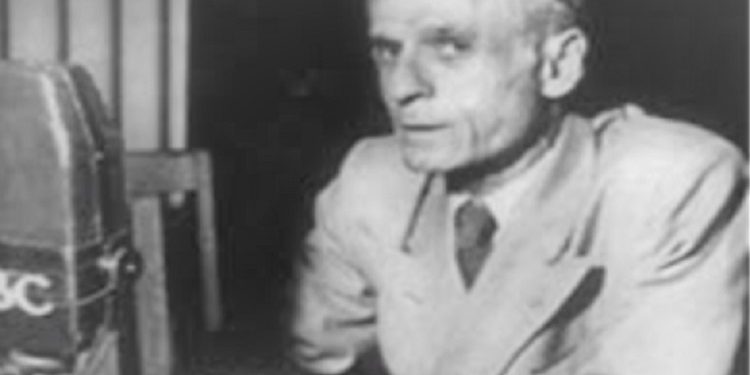
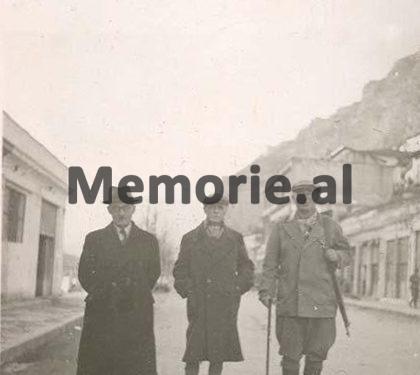
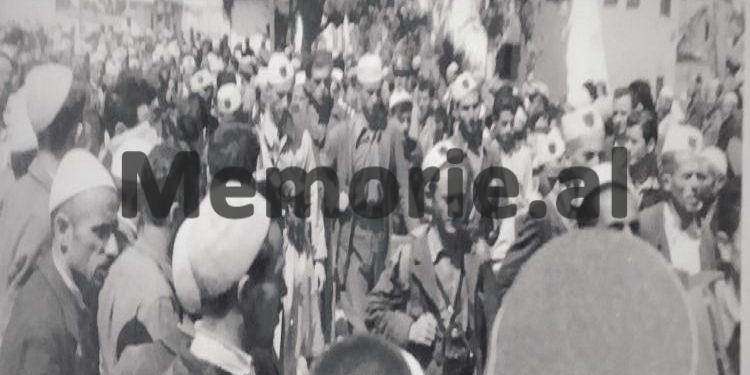
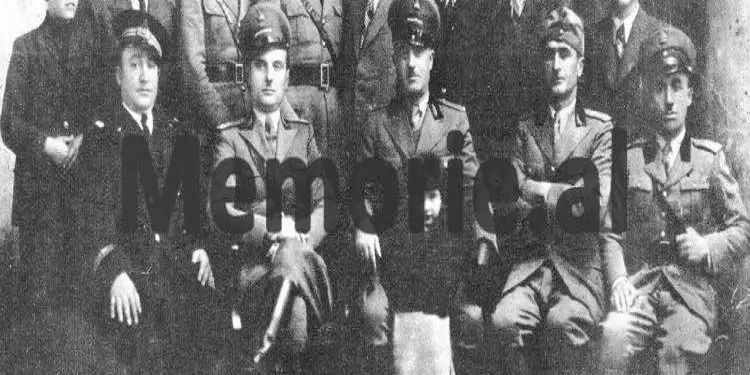
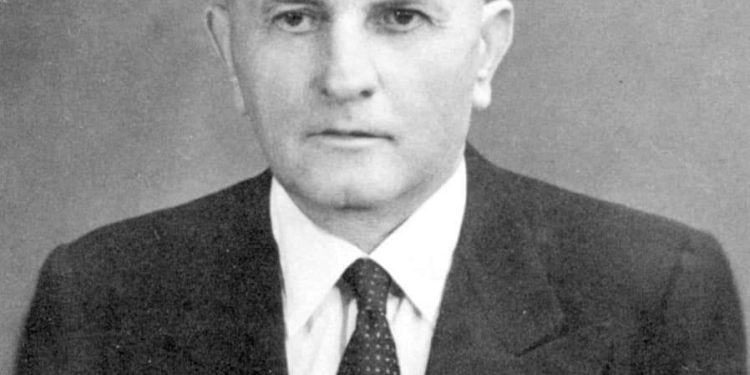
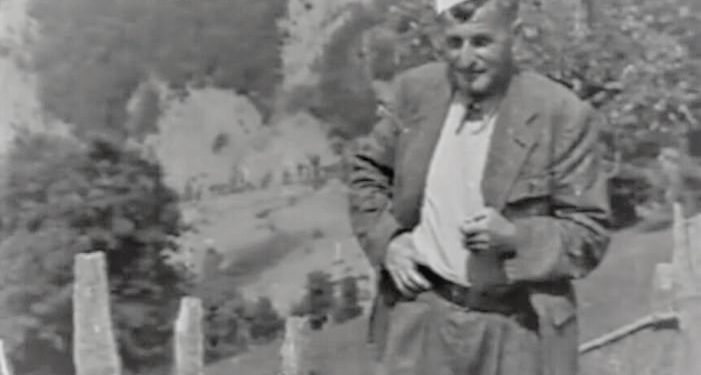
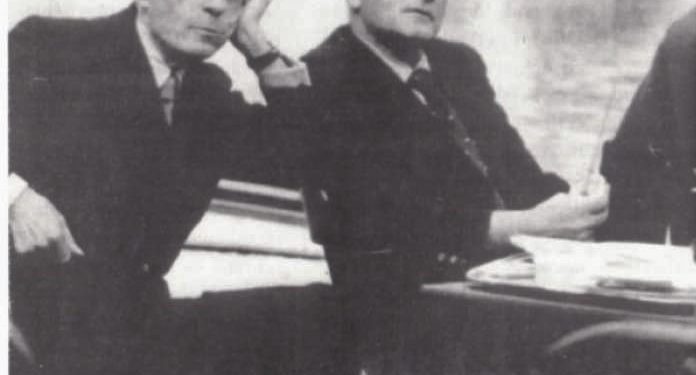
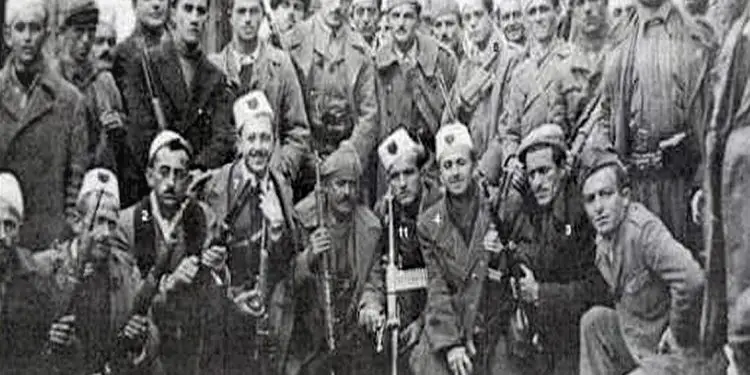
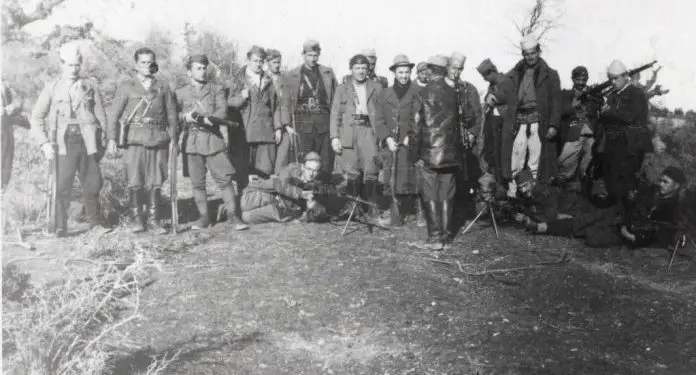
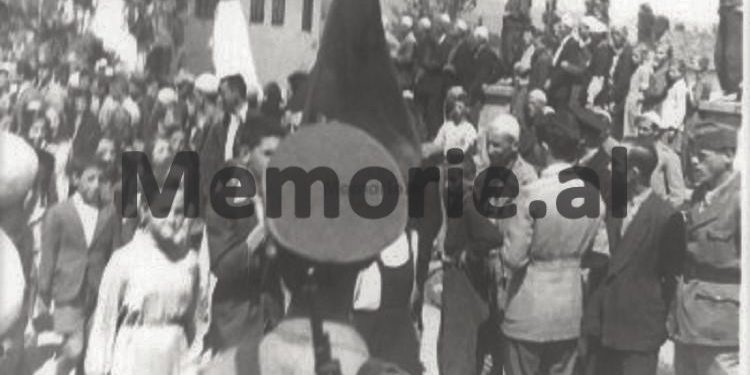
![“When the party secretary told me: ‘Why are you going to the city? Your comrades are harvesting wheat in the [voluntary] action, where the Party and Comrade Enver call them, while you wander about; they are fighting in Vietnam,’ I…”/ Reflections of the writer from Vlora.](https://memorie.al/wp-content/uploads/2025/06/admin-ajax-4-350x250.jpg)


![“The ensemble, led by saxophonist M. Murthi, violinist M. Tare, [with] S. Reka on accordion and piano, [and] saxophonist S. Selmani, were…”/ The unknown history of the “Dajti” orchestra during the communist regime.](https://memorie.al/wp-content/uploads/2026/02/admin-ajax-3-350x250.jpg)
![“In an attempt to rescue one another, 10 workers were poisoned, but besides the brigadier, [another] 6 also died…”/ The secret document of June 11, 1979, is revealed, regarding the deaths of 6 employees at the Metallurgy Plant.](https://memorie.al/wp-content/uploads/2026/02/maxresdefault-350x250.jpg)

